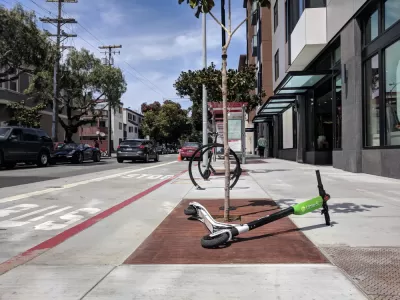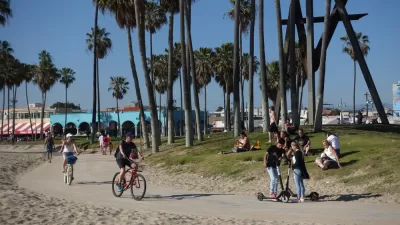Electric scooters in Portland will pay a road fee, but according to this article, cities would do well to hold cars to the same standard as scooters.

[Updated August 7, 2018] E-scooter companies are going to start paying a fee for road use in Portland. Joe Cortright argues cars should too. When Seattle gets scooter share from Lime, the company will pay a $365 yearly fee to support street maintenance. Cortright argues cars should be asked to do the same.
"Scooters are smaller and cleaner than cars. A scooter occupies only a tiny fraction of the space occupied by a typical automobile," Joe Cortright writes for City Observatory. It seems only fair to Cortright that the city ask for a similar or larger fee from drivers. "If they each paid a dollar a day toward the cost of city streets, that would work out to about $365 per day, which is more than triple the amount of money that the State of Oregon (not the city) charges as an annual vehicle registration fee," Cortright argues.
Beyond space considerations, there are maintenance costs to consider, a vehicle that weighs close to a ton is going to put a lot more wear on a street than a 25-pound scooter. Some cities charge more than Portland for city stickers and city sticker tickets. In Chicago, policies that have increased those costs have lead to bankruptcies. Still, if cities are serious about climate change, a higher yearly cost for drivers maybe a way to get more walkers, bikers, and scooter riders.
[The post was corrected to reflect the correct location for the scooter fee policy. The previous version fo the post erroneously located the policy news in Seattle.]
FULL STORY: E-Scooters and Paying for Roads

Alabama: Trump Terminates Settlements for Black Communities Harmed By Raw Sewage
Trump deemed the landmark civil rights agreement “illegal DEI and environmental justice policy.”

Planetizen Federal Action Tracker
A weekly monitor of how Trump’s orders and actions are impacting planners and planning in America.

The 120 Year Old Tiny Home Villages That Sheltered San Francisco’s Earthquake Refugees
More than a century ago, San Francisco mobilized to house thousands of residents displaced by the 1906 earthquake. Could their strategy offer a model for the present?

In Both Crashes and Crime, Public Transportation is Far Safer than Driving
Contrary to popular assumptions, public transportation has far lower crash and crime rates than automobile travel. For safer communities, improve and encourage transit travel.

Report: Zoning Reforms Should Complement Nashville’s Ambitious Transit Plan
Without reform, restrictive zoning codes will limit the impact of the city’s planned transit expansion and could exclude some of the residents who depend on transit the most.

Judge Orders Release of Frozen IRA, IIJA Funding
The decision is a victory for environmental groups who charged that freezing funds for critical infrastructure and disaster response programs caused “real and irreparable harm” to communities.
Urban Design for Planners 1: Software Tools
This six-course series explores essential urban design concepts using open source software and equips planners with the tools they need to participate fully in the urban design process.
Planning for Universal Design
Learn the tools for implementing Universal Design in planning regulations.
Clanton & Associates, Inc.
Jessamine County Fiscal Court
Institute for Housing and Urban Development Studies (IHS)
City of Grandview
Harvard GSD Executive Education
Toledo-Lucas County Plan Commissions
Salt Lake City
NYU Wagner Graduate School of Public Service





























